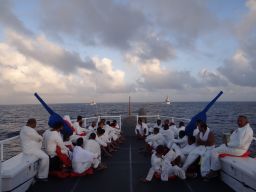Story highlights
Rumors in Cuba suggest it may soon be harder to get asylum in U.S.
U.S. Coast Guard reports huge increase in number of Cubans found at sea
The rumors may be coming from human smugglers or boat builders, Coast Guard says
Rumors of another major change in U.S.-Cuba policy are sparking a surge in Cuban migrants in recent days, according to the U.S. Coast Guard.
Agency officials tell CNN that Cubans are being told the decades-old “wet foot, dry foot” policy is going away on January 15, and that has many of them attempting to reach the United States.
The policy, which was enacted in 1995, grants asylum to any Cuban who reaches U.S. soil, or “dry foots.” But most Cubans found at sea would be sent back to Cuba. Any change to that policy, which is part of the Cuban Adjustment Act, would need approval by Congress, which is highly unlikely to happen.
“We recognize that when these rumors continue to perpetuate, they grow. People believe it. They may get desperate. They may try and take to the sea,” said Capt. Mark Fedor, the chief of response for the Coast Guard’s 7th District, which patrols most of the waters around the island nation.
Since the Obama administration announced a renewal of diplomatic relations with the Castro government on December 16, the Coast Guard says there has been a 235% increase in the number of Cubans found at sea, compared with the first two weeks of December. Overall, the final month of 2014 saw a 117% jump year to year in the number of migrants from the Communist island.

“Having this many people at sea, in very unseaworthy vessels – it just makes for a very dangerous environment,” said Fedor.
The source of the rumors is unknown. But, Coast Guard officials believe human smugglers and builders of makeshift boats may be partly to blame.
“These boats aren’t just laying around. These people are getting paid to build these boats. That’s the profit motive behind all this,” said Fedor. “There are people making money off of this. And they don’t care about the safety of these folks. I think it’s in their benefit to perpetuate these rumors. And we’re trying to combat that.”
Ever since Fidel Castro took power in Cuba in 1959, there have been incidents of mass migration from Cuba – the most famous of which was the Mariel boatlift of 1980, when roughly 125,000 Cubans landed on Florida’s shores within a six-month span.
Although the recent surge is not considered a mass migration, Fedor says, “We’re always attentive to that. There’s a variety of factors that could lead to a mass migration. But right now, we’re not at that level.”
But, just in case, Fedor says the Coast Guard has put additional resources in the Florida Straits to deal with the current situation.
